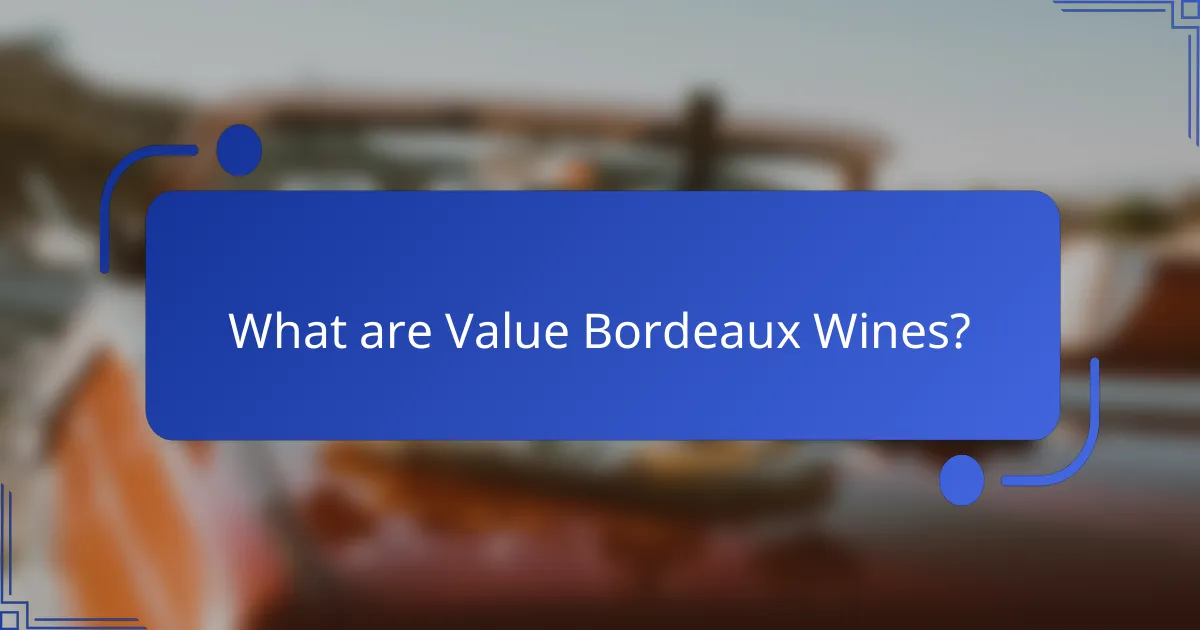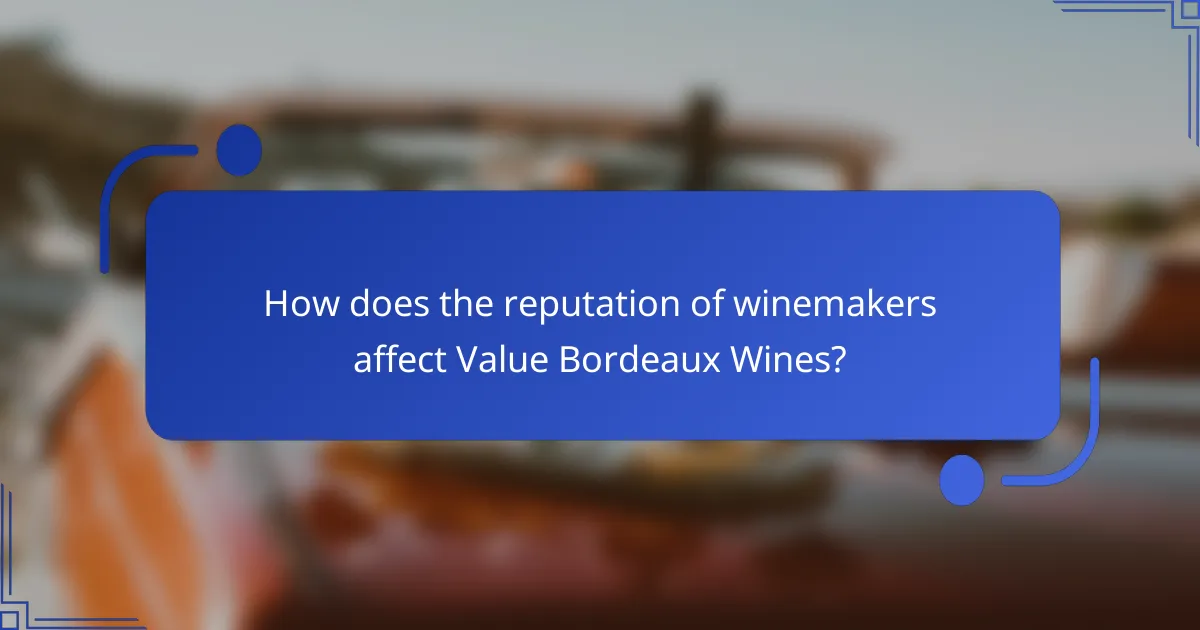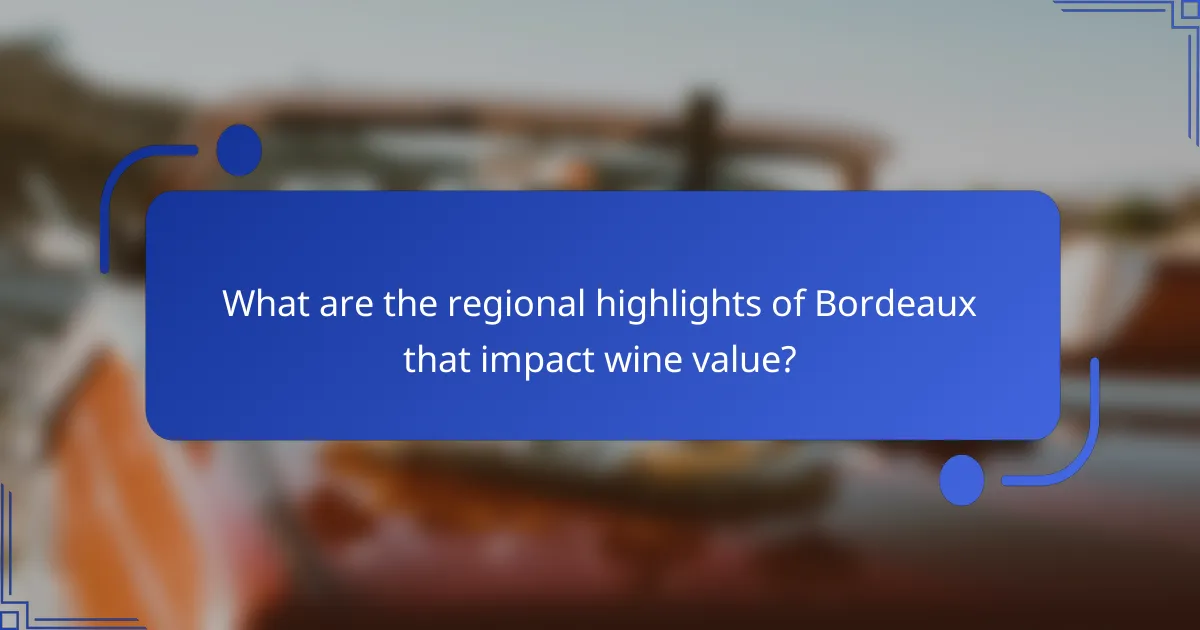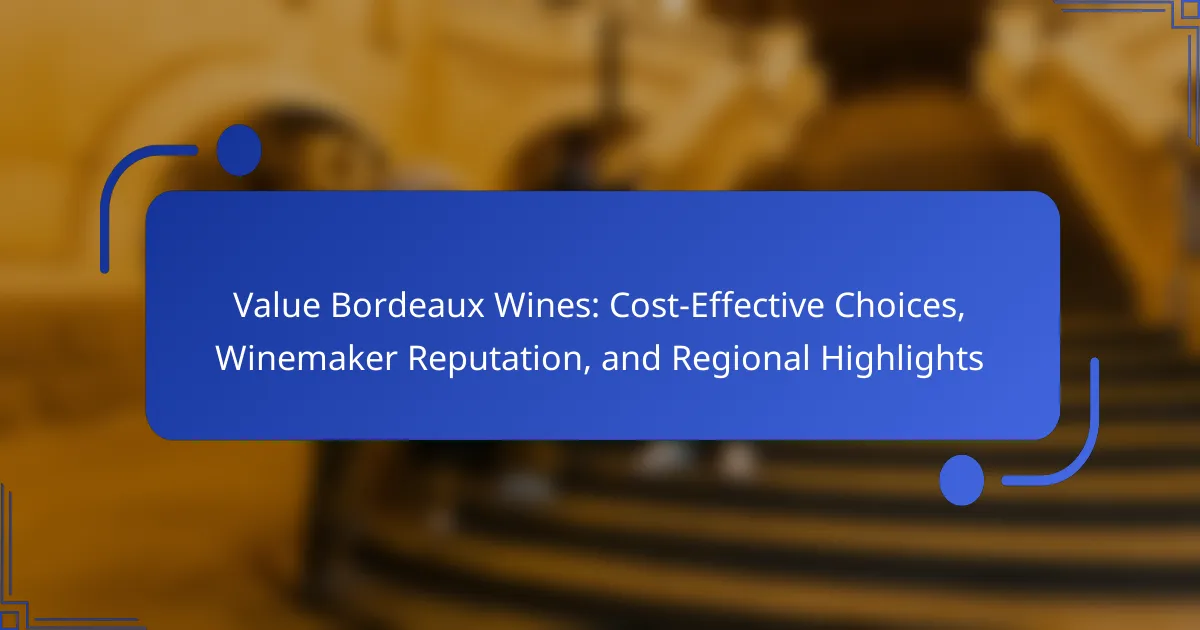
What are Value Bordeaux Wines?
Value Bordeaux wines are affordable wines from the Bordeaux region of France. They typically offer quality at a lower price point compared to premium Bordeaux wines. These wines are often produced by reputable winemakers who focus on value. Value Bordeaux wines can be sourced from various sub-regions within Bordeaux. They often feature classic Bordeaux grape varieties such as Cabernet Sauvignon and Merlot. Many value options are available in the $10 to $30 range, making them accessible to a wider audience. The wines are characterized by good balance and flavor complexity. This combination of quality and price makes them popular among wine enthusiasts.
How are Value Bordeaux Wines defined?
Value Bordeaux Wines are defined as wines from the Bordeaux region that offer quality at an affordable price. These wines typically range from $10 to $30 per bottle. They are characterized by their balance of taste and value. Many value Bordeaux wines come from lesser-known appellations. Winemakers often produce these wines with the same care as premium options. The reputation of the Bordeaux region supports the perceived quality. Additionally, these wines are made from classic grape varieties like Merlot and Cabernet Sauvignon. This combination of factors makes them appealing to consumers seeking quality without high costs.
What characteristics distinguish Value Bordeaux Wines from others?
Value Bordeaux Wines are distinguished by their affordability, quality, and regional authenticity. They typically offer a balance of rich flavors and complexity at a lower price point compared to premium Bordeaux wines. Many Value Bordeaux Wines come from reputable winemakers known for their craftsmanship. The grapes used are often sourced from established vineyards in Bordeaux, ensuring a level of quality. These wines frequently exhibit classic Bordeaux characteristics, such as dark fruit flavors, earthy undertones, and firm tannins. Additionally, they are often aged in oak barrels, which adds depth and enhances their profile. The combination of these factors makes Value Bordeaux Wines appealing to both casual drinkers and connoisseurs seeking quality without the high cost.
Why is the term ‘value’ significant in the context of Bordeaux Wines?
The term ‘value’ is significant in the context of Bordeaux Wines because it reflects the quality-to-price ratio of these wines. Bordeaux is known for producing high-quality wines that can cater to various budgets. Many Bordeaux wines offer exceptional taste and aging potential without the high price tag associated with prestigious labels. This makes them attractive options for both novice and experienced wine enthusiasts. Additionally, the reputation of Bordeaux as a wine-producing region enhances the perceived value of its wines. According to the Bordeaux Wine Council, the region produces over 8,000 different wines, providing a wide range of choices for consumers. The diversity in price and quality allows consumers to find wines that fit their preferences and budgets, making Bordeaux wines a valuable addition to any collection.
What factors contribute to the value of Bordeaux Wines?
The value of Bordeaux wines is influenced by several key factors. These include the wine’s origin, grape variety, and aging potential. Bordeaux wines are often associated with prestigious regions, such as Médoc and Saint-Émilion. The reputation of the winemaker also plays a critical role in determining value. Notable producers can significantly increase a wine’s market price. Additionally, the vintage year impacts value, as certain years yield exceptional quality. The wine’s scarcity and demand in the market further affect pricing. Lastly, wine ratings from critics can enhance perceived value, influencing consumer purchasing decisions.
How does pricing influence the perception of value in Bordeaux Wines?
Pricing significantly influences the perception of value in Bordeaux wines. Higher prices often suggest superior quality and exclusivity. Consumers associate expensive wines with better craftsmanship and aging potential. Research shows that price can affect taste perception, leading to a bias where people believe higher-priced wines taste better. Bordeaux wines, particularly those from renowned châteaux, command premium prices due to their reputation. This reputation is built on historical quality and winemaker expertise. Additionally, limited availability can enhance perceived value. Therefore, pricing serves as a key indicator of quality and desirability in Bordeaux wines.
What role does winemaker reputation play in determining value?
Winemaker reputation significantly influences the value of wines. A well-regarded winemaker often commands higher prices due to perceived quality. Consumers trust established winemakers for consistency and craftsmanship. This trust can lead to increased demand and higher market prices. For example, wines from renowned Bordeaux producers often sell for premium prices. Historical performance and accolades contribute to a winemaker’s reputation. Awards and critical reviews enhance consumer confidence in the product. Thus, a winemaker’s reputation directly correlates with the wine’s market value.

How does the reputation of winemakers affect Value Bordeaux Wines?
The reputation of winemakers significantly influences the perceived value of Bordeaux wines. Well-regarded winemakers often produce wines that command higher prices. Their established credibility assures consumers of quality and consistency. This reputation can enhance demand, driving up market value. Additionally, wines from reputable producers may receive higher ratings from critics. For example, wines from Château Margaux or Château Lafite Rothschild often sell at premium prices due to their esteemed reputations. Conversely, lesser-known winemakers may struggle to achieve similar market recognition. This dynamic illustrates how winemaker reputation directly correlates with the value of Bordeaux wines.
What are the most notable winemakers in Bordeaux?
The most notable winemakers in Bordeaux include Château Margaux, Château Lafite Rothschild, and Château Latour. These estates are renowned for their exceptional quality and historical significance. Château Margaux is celebrated for its elegance and aromatic complexity. Château Lafite Rothschild is recognized for its consistent excellence and aging potential. Château Latour is known for its powerful and structured wines. Each of these winemakers has contributed to Bordeaux’s reputation as a premier wine region. Their wines often receive high scores from critics, further validating their status in the wine industry.
How does a winemaker’s history impact the value of their wines?
A winemaker’s history significantly impacts the value of their wines. This influence stems from factors such as reputation, experience, and heritage. Established winemakers often have a proven track record of producing high-quality wines. Their historical success builds trust among consumers and collectors. For instance, wineries with a legacy of excellence, like Château Margaux, command higher prices due to their storied past. The winemaker’s knowledge of terroir and techniques also improves wine quality over time. Historical context, such as awards and recognitions, further enhances perceived value. In summary, a winemaker’s history shapes consumer perceptions and market demand, directly affecting wine prices.
What accolades or recognitions enhance a winemaker’s reputation?
Awards from prestigious wine competitions enhance a winemaker’s reputation. Recognitions such as the Decanter World Wine Awards, International Wine Challenge, and Wine Spectator ratings are significant. Winning gold or silver medals at these events can elevate visibility. High scores from critics like Robert Parker also boost credibility. Participation in renowned wine festivals adds to a winemaker’s prestige. Certifications like organic or biodynamic status can attract attention. Notable collaborations with esteemed vineyards can enhance reputation as well. Ultimately, these accolades signal quality and expertise in winemaking.
How can consumers evaluate winemaker reputation?
Consumers can evaluate winemaker reputation by researching their history, awards, and reviews. A winemaker’s history provides insight into their experience and expertise. Awards from recognized competitions indicate quality and recognition in the industry. Reviews from wine critics and consumers offer personal experiences and opinions. The reputation can also be assessed through the quality of wines produced over time. Consistency in producing high-quality wines strengthens a winemaker’s reputation. Additionally, examining vineyard practices and sustainability efforts can reflect a winemaker’s commitment to quality. Engaging with wine communities and forums can provide further insights into winemaker reputation.
What resources are available for researching Bordeaux winemakers?
Resources for researching Bordeaux winemakers include wine guides, databases, and academic journals. Notable wine guides like “Wine Spectator” and “Robert Parker’s Wine Advocate” provide detailed reviews and ratings. Online databases such as Wine-Searcher and Vivino offer user-generated reviews and pricing information. Academic journals like the “Journal of Wine Economics” publish research on winemaking practices and regional studies. Additionally, local wine associations and Bordeaux’s official website offer insights into winemaker profiles and vineyard practices. These resources collectively enhance understanding of Bordeaux winemakers and their contributions to the wine industry.
How can consumer reviews and ratings influence purchasing decisions?
Consumer reviews and ratings significantly influence purchasing decisions by providing potential buyers with insights into product quality. Positive reviews can enhance a product’s credibility and encourage purchases. Conversely, negative reviews may deter consumers from buying. Research indicates that 79% of consumers trust online reviews as much as personal recommendations. Ratings also impact search engine rankings, making products with higher ratings more visible. In the context of Bordeaux wines, reviews can highlight value, quality, and the reputation of winemakers, guiding consumers towards cost-effective choices.

What are the regional highlights of Bordeaux that impact wine value?
Bordeaux’s regional highlights significantly impact wine value. The region’s diverse terroirs contribute to unique flavor profiles. The classification system, including the 1855 Classification, establishes prestige and pricing. Bordeaux’s reputation for Cabernet Sauvignon and Merlot enhances its desirability. The influence of the Atlantic Ocean moderates climate, affecting grape quality. Historical significance and tradition also elevate perceived value. Additionally, renowned châteaux like Château Margaux and Château Lafite Rothschild command high prices due to their legacy. These factors collectively shape the market dynamics of Bordeaux wines.
Which Bordeaux regions are known for producing value wines?
The Bordeaux regions known for producing value wines include Bordeaux Supérieur, Côtes de Bordeaux, and Bordeaux Clairet. Bordeaux Supérieur offers good quality wines at accessible prices. Côtes de Bordeaux is recognized for its diverse terroirs and value-driven blends. Bordeaux Clairet is a unique rosé style that provides excellent quality for the price. These regions consistently deliver wines that are both affordable and well-regarded. Their reputation for quality and affordability has been established over decades.
What specific attributes do these regions contribute to the wines?
Bordeaux regions contribute various specific attributes to the wines. These attributes include terroir, climate, grape variety, and winemaking techniques. Terroir influences the flavor profile and complexity of the wines. For instance, the gravelly soils of the Médoc region enhance Cabernet Sauvignon’s structure. The climate in Bordeaux is maritime, promoting balanced acidity and ripeness in grapes. Different grape varieties like Merlot and Cabernet Franc add unique characteristics to the blends. Winemaking techniques, such as barrel aging, further develop the wine’s depth and aromas. These factors collectively define the quality and distinctiveness of Bordeaux wines.
How do climate and terroir affect wine production in these areas?
Climate and terroir significantly influence wine production in Bordeaux. Climate determines the temperature, rainfall, and sunlight that affect grape growth. Bordeaux has a maritime climate, which provides moderate temperatures and adequate rainfall. This climate allows for the cultivation of various grape varieties.
Terroir encompasses soil composition, topography, and microclimates in specific vineyard locations. The diverse soils in Bordeaux, including clay, limestone, and gravel, contribute unique flavors to the grapes. For example, clay retains moisture, benefiting Merlot, while gravelly soils enhance Cabernet Sauvignon.
Additionally, the proximity to rivers affects local temperature and humidity levels. The Garonne and Dordogne rivers create a temperate environment ideal for ripening grapes. Historical data shows that specific regions within Bordeaux, like Saint-Émilion and Médoc, produce distinct wine profiles due to their unique terroirs.
Overall, climate and terroir work together to shape the characteristics of Bordeaux wines, leading to a diverse range of flavors and styles.
What trends are currently shaping the Bordeaux wine market?
The Bordeaux wine market is currently shaped by several key trends. There is a growing demand for organic and biodynamic wines. Consumers increasingly prioritize sustainability in their purchasing decisions. Additionally, there is a rise in interest for lesser-known Bordeaux regions. This trend diversifies options beyond the traditional Left and Right Banks. Furthermore, younger consumers are becoming a significant market segment. They are more inclined to explore value-driven wines. Digital marketing and e-commerce are also transforming sales strategies. Online platforms are making Bordeaux wines more accessible to global consumers. Lastly, wine tourism is gaining popularity, enhancing brand engagement and consumer education.
How is consumer demand influencing the pricing of Bordeaux wines?
Consumer demand significantly influences the pricing of Bordeaux wines. Increased consumer interest leads to higher prices due to scarcity and perceived value. For instance, popular vintages see price surges during auctions. The Bordeaux wine market is also affected by trends, such as the rise in demand for organic wines. Additionally, global markets play a role; demand from Asia has driven prices up. According to Liv-ex, the Bordeaux 500 index rose by over 10% in 2021, reflecting heightened consumer interest. Furthermore, limited releases create exclusivity, further driving up prices. Overall, consumer demand directly correlates with Bordeaux wine pricing dynamics.
What emerging regions within Bordeaux are gaining attention for value wines?
The emerging regions within Bordeaux gaining attention for value wines include Côtes de Bordeaux and Bordeaux Supérieur. Côtes de Bordeaux offers a diverse range of blends at competitive prices. Bordeaux Supérieur is known for higher quality standards while remaining affordable. Both regions have seen increased investment and attention from winemakers. This focus on quality has led to better recognition in the market. Additionally, these areas benefit from the Bordeaux reputation for excellence. As a result, consumers are discovering value options in these regions.
What tips can help consumers select Value Bordeaux Wines?
To select Value Bordeaux Wines, consumers should focus on specific criteria. First, consider the wine’s classification. Bordeaux wines are classified into categories, such as AOC and Grand Cru. AOC wines often provide good quality at lower prices. Second, examine the vintage year. Some years yield better quality wines, impacting value. Third, research the winemaker’s reputation. Established winemakers often produce reliable wines. Fourth, look for lesser-known regions within Bordeaux. These regions can offer excellent wines at lower prices. Lastly, check for reviews and ratings from trusted sources. These insights can guide consumers toward quality selections.
How can consumers identify great value options when shopping for Bordeaux wines?
Consumers can identify great value options when shopping for Bordeaux wines by focusing on lesser-known appellations. These wines often provide quality at lower prices compared to prestigious regions like Médoc or Saint-Émilion. Research shows that wines from regions such as Côtes de Bordeaux or Bordeaux Supérieur can deliver exceptional taste without the premium cost.
Additionally, consumers should consider the vintage. Some years yield better value due to lower demand. For instance, 2011 and 2014 Bordeaux vintages are often overlooked but offer good quality at reasonable prices.
Another strategy is to explore wines from emerging winemakers. These producers may offer high-quality wines at competitive prices to establish their reputation.
Lastly, seeking recommendations from trusted wine critics or guides can help identify value options. Critics often highlight hidden gems that offer excellent quality for the price.
What are the common pitfalls to avoid when purchasing Bordeaux wines?
Common pitfalls to avoid when purchasing Bordeaux wines include not verifying the vintage. Bordeaux wines can vary significantly by year. Understanding the reputation of the specific vintage is crucial for quality. Another pitfall is neglecting to research the producer’s reputation. Well-known producers often deliver consistent quality. Additionally, overlooking the importance of region can lead to poor choices. Certain Bordeaux regions are renowned for specific grape varieties and styles. Failing to consider storage conditions can also affect wine quality. Proper storage influences the wine’s aging potential and taste. Lastly, being swayed by price alone can be misleading. Higher prices do not always guarantee better quality in Bordeaux wines.
Value Bordeaux wines are affordable options from the Bordeaux region of France, characterized by quality and balance at a price range typically between $10 to $30. The article explores how these wines are defined, their distinguishing characteristics, and the significance of ‘value’ in the context of Bordeaux wines. It also examines the impact of winemaker reputation, regional highlights, and current market trends on pricing and consumer demand, providing tips for selecting great value options while avoiding common purchasing pitfalls.
